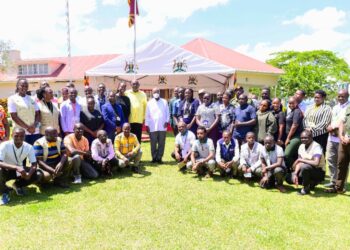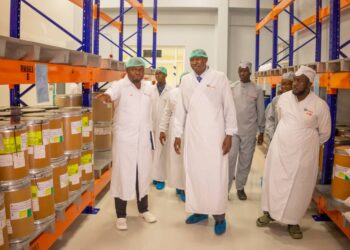By Mudecha Aramathani
The Ministry of Agriculture, Animal Industry, and Fisheries (MAAIF) in close collaboration with Hortifresh are poised to implement interventions aimed at reducing interceptions in Uganda’s agriculture product export market.
This initiative began by conducting training sessions for agronomists. These sessions focused on the proper use of agrochemicals and strategies to minimize interceptions of Ugandan produce in the international export market.
The engagement of agronomists was led by the Hortifresh Association in conjunction with MAAIF. The event took place on Thursday, November 23rd, 2023, at the Hortifresh Secretariat Office in Mengo, Balintuma Road.
MAAIF’s DCIC/NPPO Interventions involve partnering with Hortifresh to train agronomists, empowering them to assist farmers and fruit/vegetable exporters in enhancing their understanding of reducing interceptions during exports.
During the training, Kirongo Patrick, MAAIF’s Agriculture Inspector, emphasized that MAAIF is collaborating closely with relevant organizations to mitigate interception challenges.
He mentioned, “As MAAIF, our partnership with Hortifresh focuses on training agronomists and exporters as vital players in the value chain. We’re also working alongside the Local Government Production Department to provide farm training and raise awareness on MRLs/SPS issues.”
HortiFresh, representing growers and exporters of Fresh Fruits and Vegetables (FFV), is collaborating with the Ministry of Agriculture, Animal Industry, and Fisheries and GIZ Uganda to conduct targeted training sessions for agronomists.
The primary goal is to provide comprehensive knowledge on good agricultural practices and sanitary and phytosanitary standards. These sessions aim to equip key stakeholders in the FFV sector with the necessary expertise to produce, supply, and export FFV products adhering to international phytosanitary standards, thereby significantly reducing interceptions.
Agronomists, professionals specializing in soil management and crop production, are pivotal in enhancing agricultural productivity, sustainability, and farming efficiency. MAAIF and Hortifresh aim to build a substantial team of experts to increase knowledge and train farmers and exporters about interception effects and threats.
The Ministry of Agriculture, Animal Industry, and Fisheries (MAAIF), alongside the EU, has highlighted a worrying surge in interceptions of Uganda’s Fresh Fruits and Vegetables (FFV) exports.
Identified root causes include exporters’ non-compliance with essential export documentation and inadequate application of agrochemicals, resulting in heightened interceptions during product testing for Maximum Residue Levels.
Consequently, significant financial losses, amounting to millions of dollars in export value, have occurred. If this trend persists, Uganda faces the imminent risk of temporary or permanent bans on fruit and vegetable exports to Europe and Asia.
Rationale for the project trainings
The rationale behind the project’s training initiatives stems from the HortiFresh Secretariat report, highlighting Uganda’s substantial potential to boost Fresh Fruits and Vegetables (FFV) exports to regional and global markets, setting a target of USD 1 Billion in exports by 2030.
However, achieving this ambitious goal demands immediate and concerted efforts to tackle the issue of interceptions. Furthermore, ensuring the provision of safe food, both for domestic consumption and international trade, stands as a paramount objective.
The training initiative becomes imperative to curb the escalating interceptions of Ugandan produce in the European market.
Recent statistics from the MAAIF FFV export trends report paint a concerning picture, indicating a staggering increase in interceptions between 2021 and 2022. These interceptions arose from harmful organisms, surpassing maximum residue levels, and errors in documentation.
Understanding Interceptions:
Interceptions in exports refer to the temporary halting or inspection of goods, such as fruits and vegetables, during the export process. These interruptions occur for various reasons, including compliance checks or quality inspections.
At times, interceptions happen to ensure adherence to phytosanitary standards. The primary aim is to prevent the spread of pests and diseases while ensuring that exported goods meet the importing country’s regulations and standards.
Alert from MAAIF:
Interceptions are on the rise due to pests, notably a new pest named Thrips, now added to the European Union’s priority pests list. Consequently, any exporter intercepted for Maximum Residue Levels (MRLs) will be subjected to emergency measures, potentially halting the export of the affected produce.
Detrimental Effects of Interceptions on Farmers and Agricultural Exporters:
Emerging issues jeopardize Uganda’s exports, posing threats that Agronomists warn the country’s farms and agricultural exporters to vigilantly address when exporting products. Kirongo Patrick, MAAIF’s Agriculture representative, informed Agronomists that these interceptions pose economic challenges for the country.
“Interceptions aren’t favorable for our economy. They lead Ugandan exporters to significant financial losses in the process of disposing of substandard cargo. The entire value chain suffers. Sometimes, interception procedures lead to export rejections,” Mr. Kirongo stated.
He added that some companies are compelled to return their cargo from the UK once standard checks and detectors find Uganda’s exports failing to meet importing countries’ standards.
To provide exporters with more information and encourage strict surveillance for the safety of their exports, MAAIF emphasizes that European fruit and vegetable importing countries are becoming increasingly stringent on MRLs.
The Middle East is also intensifying its vigilance on both MRLs and quarantine-significant pests. Therefore, it’s crucial for farmers, as the initial link in the value chain, to possess sufficient knowledge in agrochemical management for fruit and vegetable cultivation.
Do you have a story in your community or an opinion to share with us: Email us at editorial@watchdoguganda.com












